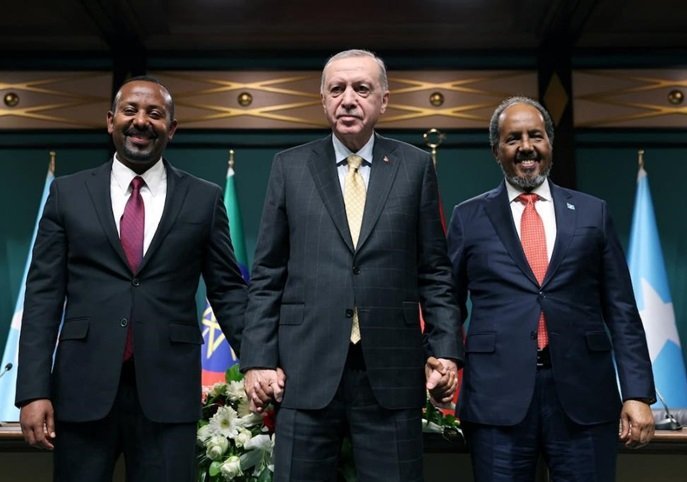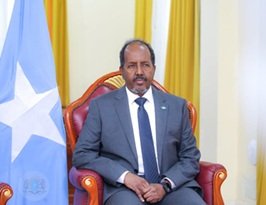By Abdelkarim A. Haji Hassan
Advisors and envoys play a critical role in government structures, typically tasked with high-priority and sensitive undertakings, and their creation does not commence lightly. Their functions include elevating the profile of specific issues, engaging directly with decision-makers and negotiators, as well as achieving objectives with minimal bureaucratic interference. These roles often directly access the presidency and other top government bodies. However, since assuming the presidency of the Federal Government of Somalia on May 16, 2022, President Hassan Sheikh Mohamud has employed a wild approach to governance, particularly regarding the appointment of numerous representatives, envoys, advisors, and committees.
Over the past three years, the president has issued more than 50 presidential decrees to appoint individuals to various roles without clear mandates, structured plans, or consultation with relevant stakeholders. These appointments span a wide range of areas, including the Constitution, Economy, Social Affairs, Governance, Women’s Affairs, Security, Drought Response, Reconciliation, Trade, Military Affairs, International Relations, and Regional Governments, among others. Notably, the number of advisors and envoys appointed by the president rivals, if not exceeds, the size of the Cabinet of Ministers, raising serious questions about the efficiency and necessity of such a sprawling structure. According to official reports from the Ministry of Finance, more than 80 advisors and envoys affiliated with the offices of the President and Prime Minister are currently on the government payroll. This figure underscores the substantial number of individuals employed in such roles within the federal government.
Despite the significant responsibilities ostensibly assigned to these officials, there have been no engagements, visible progress, or tangible outcomes from their roles. Many of these appointments appear to lack a clear purpose or strategic direction, with no evidence of meaningful engagement or consultation between the president and those he has appointed. This has led to a governance style characterized by isolation, where the president bypasses traditional governance structures such as the Prime Minister, the Council of Ministers, and the countless committees he appointed. Amidst the proliferation of advisors and envoys, the president has increasingly centralized decision-making, assuming responsibilities that typically fall under the purview of the executive branch while sidelining the collaborative processes envisioned in Somalia’s federal system.
Appointments without clear purpose or strategic direction have become a hallmark of President Hassan Sheikh Mohamud’s administration, with the creation of new titles and roles resembling the routine issuance of a trade business license rather than a thoughtful process of governance.
Ordinary citizens and political observers alike are left questioning why President Hassan has chosen to appoint such a large number of individuals to advisory, envoy, and representative roles, knowing full well that many of these positions are merely by name and unlikely to yield any meaningful work or tangible outcomes. Why does he appoint people to advisors and committees knowing well that he is not going to use them? Beyond bestowing these appointees with largely symbolic titles, the president’s approach has cheapened public service and volunteering contribution of the country’s intellectuals to their country.
The Case of the National Committee on the Defense of the Sovereignty and Territorial Integrity of Somalia
A striking example of this trend is the establishment of the National Committee on the Defense of the Sovereignty and Territorial Integrity of Somalia (Guddiga Qaran ee Difaaca Madax-bannaanida iyo Midnimada Dhuleed ee Soomaaliya), by President Hassan in response to the controversial Memorandum of Understanding (MoU) between Somaliland and Ethiopia on January 1, 2024. Tasked with addressing national security concerns arising from the agreement, the committee was created through Presidential Decree LR.173, citing Articles 87 and 90 of the Somali Constitution. Composed of 10 members, the committee included individuals with extensive political and legal expertise, as well as political entrepreneurs familiar with the corridors of every Somali government.
Although the committee was operating voluntarily, they were framed as a strategic response to what President Hassan described as a national defense initiative against Ethiopia, which threatened the country’s territorial integrity, particularly concerning access to the sea. Since the committee’s formation, Somalia and Ethiopia have held approximately four meetings, each marked by a lack of consultation and inclusivity with the established body. The first meeting between Somalia and Ethiopia conducted in Nairobi, Kenya, was shrouded in secrecy and not publicly disclosed, reflecting the sensitive nature of the discussions and Somalia’s lack of preparedness. Subsequent meetings were held in Turkey, signaling a shift in diplomatic approach, a change of Somalia’s stand, and the involvement of international mediators.
As Somalia actively pursued a policy aimed at defending its maritime borders, despite its initial mandate to safeguard Somalia’s territorial sovereignty and rally public support against external threats, the committee’s role has been increasingly marginalized in critical discussions. For instance, during the first official meeting in Turkey in July 2024, the national committee played a minimal role, with limited input into the proceedings. This trend of exclusion became more pronounced in later meetings. The August 2024 meeting and the December 2024 meeting between President Hassan Sheikh and Ethiopian Prime Minister Abiy Ahmed were conducted without the committee’s involvement, effectively sidelining its members from contributing to or even being consulted on key decisions. The most recent meeting on February 18, 2025, continued this pattern, with the committee entirely shut out of the process.
The committee has been shut down from significantly participating or contributing to the very cause for which it was created. Their consistent and tangible participation in the negotiation for which it was created could have helped the president and the country, instead, the president and his close allies are in the habit of sending different talking heads to each meeting where Ethiopia has maintained one high-caliber team of negotiators.

Despite its formal establishment, the committee appears to have been created more as a reaction to political emotions and public sentiment rather than as a result of the president’s full commitment or genuine intention to receive input. This lack of substantive backing from the presidency has undermined the committee’s effectiveness and raised questions about its true purpose. This pattern of ad hoc appointments and lack of follow-through has fueled frustration among concerned public and political stakeholders, who view these actions as emblematic of a broader lack of strategic vision and accountability in the administration.
The National Committee on the Defense of the Sovereignty and Territorial Integrity of Somalia could have made a meaningful contribution to address the critical issues surrounding Somalia’s territorial integrity and regional relations, if empowered with the necessary tools and authority. They consisted of highly experienced individuals. however, the lack of genuine commitment from the presidency, combined with the absence of support significantly undermined their effectiveness. This missed opportunity underscores the importance of not only establishing advisory bodies but also ensuring they are equipped and empowered to fulfill their intended roles. Without such support, even well-intentioned initiatives risk devolving into symbolic gestures rather than serving as instruments of meaningful and impactful change.
The committee’s gradual dissolution mirrors the fate of numerous other appointments made by the president, which often appear to serve more as symbolic gestures than as functional mechanisms for addressing national challenges. This pattern reflects a tendency toward centralization of decision-making, governance incompetency, and a lack of genuine consultation with appointed bodies, undermining their potential effectiveness and eroding public trust in governance structures.
The committee’s trajectory—from its inception as a defensive measure to its eventual sidelining—highlights the challenges of implementing cohesive and inclusive strategies in Somalia’s complex political landscape, particularly with Ethiopia’s increasing aggression. It also raises questions about the efficacy of ad hoc committees in addressing long-term national security and diplomatic issues, particularly when they are not integrated into broader governance frameworks or given the authority to influence outcomes.
Nevertheless, a pressing question remains: given President Hassan Sheikh Mohamud’s evident pattern of sidelining the numerous advisors, envoys, and committees he has appointed—rendering their roles largely symbolic and ineffective—why do these appointees continue to remain in their positions? Why have they not resigned in the face of their apparent marginalization and lack of meaningful engagement?
This raises concerns about the motivations behind their continued existence. The persistence of these appointees in largely ceremonial roles highlights systemic flaws in Somalia’s governance structure, where positions are often created and maintained for reasons other than their functional utility or contribution to the public good.
From Decree to Disarray- The Illusion of Governance
As Somalia continues to navigate its relationship with Ethiopia and other regional actors, the need for inclusive, and strategically coherent approaches to governance and diplomacy remains critical. The current approach not only fails to address immediate challenges but also risks further destabilizing Somalia’s fragile political environment.
The duty to serve the nation has increasingly devolved into what can only be described as a family and tribal business venture, where the public office is treated as a means of personal enrichment and patronage rather than a commitment to the common good. It has become alarmingly common—and seemingly without shame—for top government officials to employ their family members and close relatives, filling nearly every available government position with individuals connected by kinship rather than competence. This practice, which appears to have been normalized and even encouraged by the highest level of politicians, including the presidency, has transformed the government into an institution that prioritizes nepotism over meritocracy.
As a result, the public sector has become populated by an inexperienced and unqualified workforce, ill-equipped to address the complex challenges facing the nation. Given Somalia’s alarmingly high unemployment rate, particularly among its youth, who constitute approximately 70% of the population, the government stands as the largest employer in the country. However, systemic favoritism and nepotism have severely undermined the efficiency and effectiveness of public institutions. By prioritizing personal connections over professional qualifications, the government has fostered a culture where connections and loyalty to family or clan outweigh the skills and expertise necessary to drive national progress.
This practice of patronage not only weakens the capacity of government institutions to deliver essential services but also erodes public trust in the state’s ability to uphold the rule of law, accountability, and fairness. As a result, the government is in a perpetual cycle of underperformance and disillusionment, further hindering Somalia’s path toward stability and development. Addressing this issue is critical to restoring confidence in public institutions and ensuring that governance serves the broader interests of the nation rather than the narrow interests of a privileged few.
This trend has also far-reaching consequences. It stifles innovation, discourages talented individuals from pursuing public service, and perpetuates a cycle of underperformance within government agencies. Moreover, it exacerbates inequality, as opportunities for employment and advancement are reserved for a select few with the right connections, rather than being accessible to all citizens based on merit.
Having lost confidence and hope in the current administration’s ability to change course, many Somalis now view the upcoming elections as a final opportunity to save the country and restore integrity and functionality to its public institutions. Otherwise, as former President Sheikh Sharif Sh. Ahmed said, “Somalia may not survive this time under President Hassan Sheik.”
As Somalia continues to face complex challenges, the need for a more structured, transparent, and results-oriented approach to governance has never been more urgent. The current trajectory not only wastes limited resources but also diverts attention from the critical issues that demand immediate action and effective leadership.
Abdelkarim A. Haji Hassan
Email: Abdelkarimhass@gmail.com


Leave a Reply